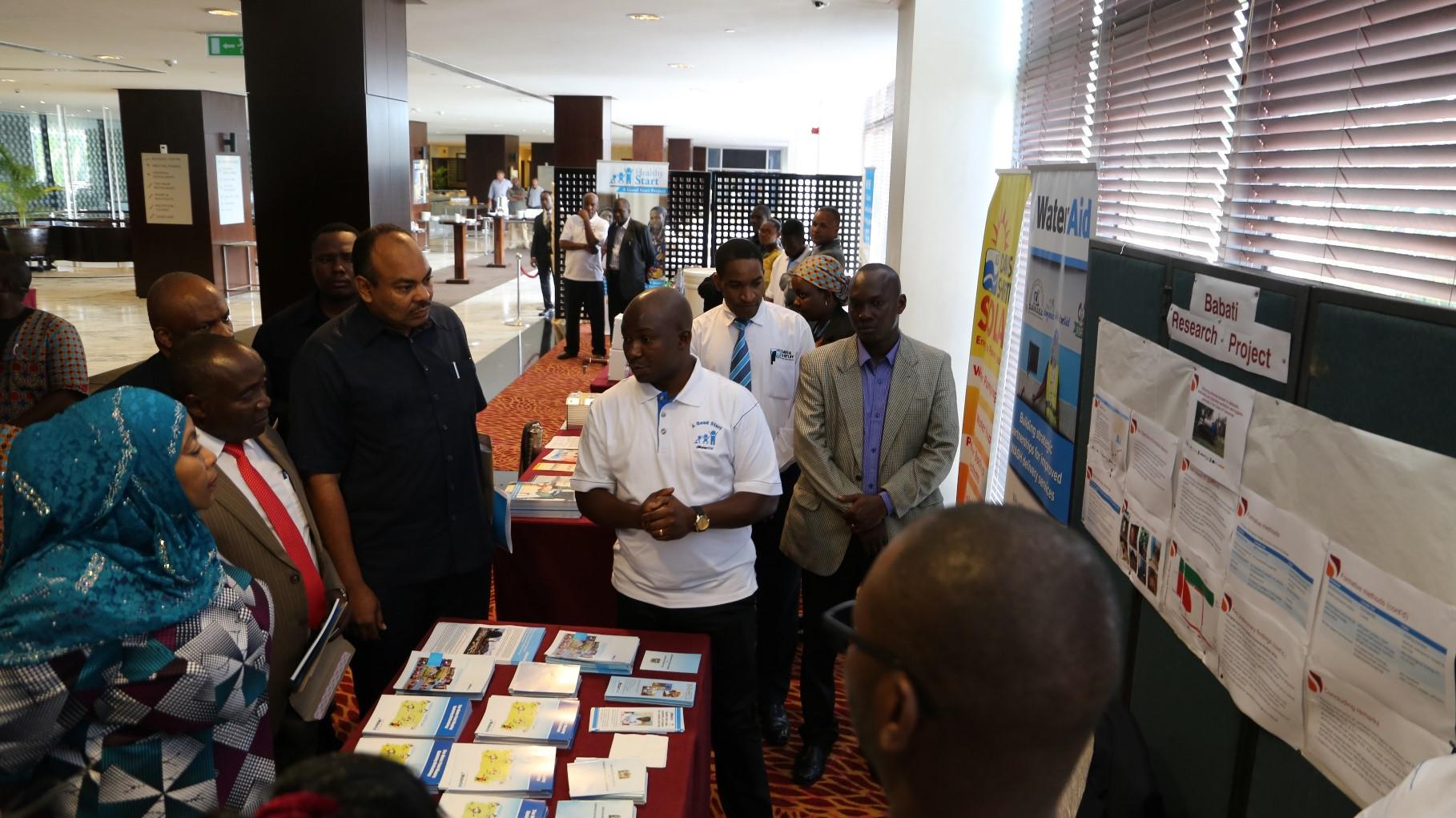Putting Water, Sanitation and Hygiene at the Centre of Development

Courtesy WaterAid - the VP and Minster of Water and Irrigation learn more about urban sanitation and technology from Edward Shana of Babati District Council.
12 Sep 2017
WaterAid Tanzania recently launched a new programme strategy at an event attended by senior government officials, including the Vice President of the United Public of Tanzania. Here, Priya Sippy, WaterAid Tanzania's Communications and Strategic Engagement Manager, tells us more.
Monday 31 July marked the official launch of WaterAid Tanzania Country Programme Strategy (CPS) 2016-2021. The theme ‘putting water, sanitation and hygiene (WASH) at the centre of development’, recognises WASH is not only a human right, but is fundamental to ensure quality healthcare and education. Through WASH development, nutritional outcomes and livelihoods can be improved, with significant health benefits especially for mothers and newborns.
Practical solutions, a showcase of technology
Flagship projects, such as WASH in health, WASH in schools, rural WASH and our research on urban sanitation, supported by a showcase of practical sustainable and innovative technologies, demonstrated how to overcome challenges experienced in the WASH sector and highlighted effective implementation of the Water Sector Development Programme Phase II (WSDP II).
The event aimed to engage agencies from high-level stakeholders, including Government officials, Development Partners, Embassies, international NGOs, private sector and donors on the CPS, bringing technology to life with demonstrations, especially useful for scale up of WASH implementation. The practical application of technology was further demonstrated by Edward Shana, (Urban sanitation research project in collaboration with SHARE) from Babati Town Council (BTC) who spoke to attendees about the Urban project, and how the research can be used to inform other small towns with urban planning.
Political support and interest
Vice President of the United Republic of Tanzania, Her Excellency, Samia Suluhu Hassan was a guest of honour. The event was also attended other key political figures including the Minister of Water and Irrigation, Gerson Lwenge and the Minister of Health, Zanzibar, Mahmoud Thabit Kombo. The Vice President, learnt about the projects, including the current challenges of sanitation in Tanzania’s cities and how this research can help growing small towns include WASH in their master planning.
In the Vice President's speech, she spoke about the Government's commitment to improving the WASH situation in the country - and referenced some of the projects and innovations she had seen from WaterAid's work. She highlighted how this theme will be taken back to the Government of Tanzania, and WASH should be integrated with all sectors of development.
The high-level delegation learn about school WASH technologies from Ivo Manyaku, from SEMA, WaterAid Tanzania’s local partner in Singida region.
The Vice President also had an opportunity to visit some of the booths, which had been set up to showcase some of the WASH technologies and innovations demonstrated in our projects. She was shown the eWATERpay technology, technologies for faecal sludge management, latrine technologies from school WASH and information on our urban sanitation research in Babati.
Edward Shana from BTC shared with the Vice President the current challenges of sanitation in Tanzania’s cities, and how this research can help growing small towns include WASH in their master planning.
The practical application of technology was further demonstrated by Edward, who spoke to attendees about the urban project entitled ‘Cities of Tomorrow’, an urban sanitation research project in collaboration with SHARE, and how the research can be used to inform other small towns with urban planning.
Moving forwards
The theme ‘Putting water, sanitation and hygiene at the centre of development” developed high level political interest, with the Vice President calling for action, directing the Minister of Water and others who attended the event to ensure that WASH is integrated in other interventions and development, such as health and education.
The event strategically placed WaterAid in a position to support the Water Sector Development Program (WSDP), highlighting practical solutions and technologies to overcome the challenges facing WSDP. The demonstration of the eWATERpay system, re-cycling and re-use of faecal sludge, as well as the testimonies on the benefits of the work on WASH in health care facilities (HCFs) from the Minister of Health in Zanzibar received great attention. This promotes scaling up of best practices: WASH in HCFs and re-use of faecal sludge were recommended as best practice by the Vice President and Minister of Health, for both Zanzibar and mainland Tanzania. It also created opportunities for further funding, building on past work including WASH in health facilities.
